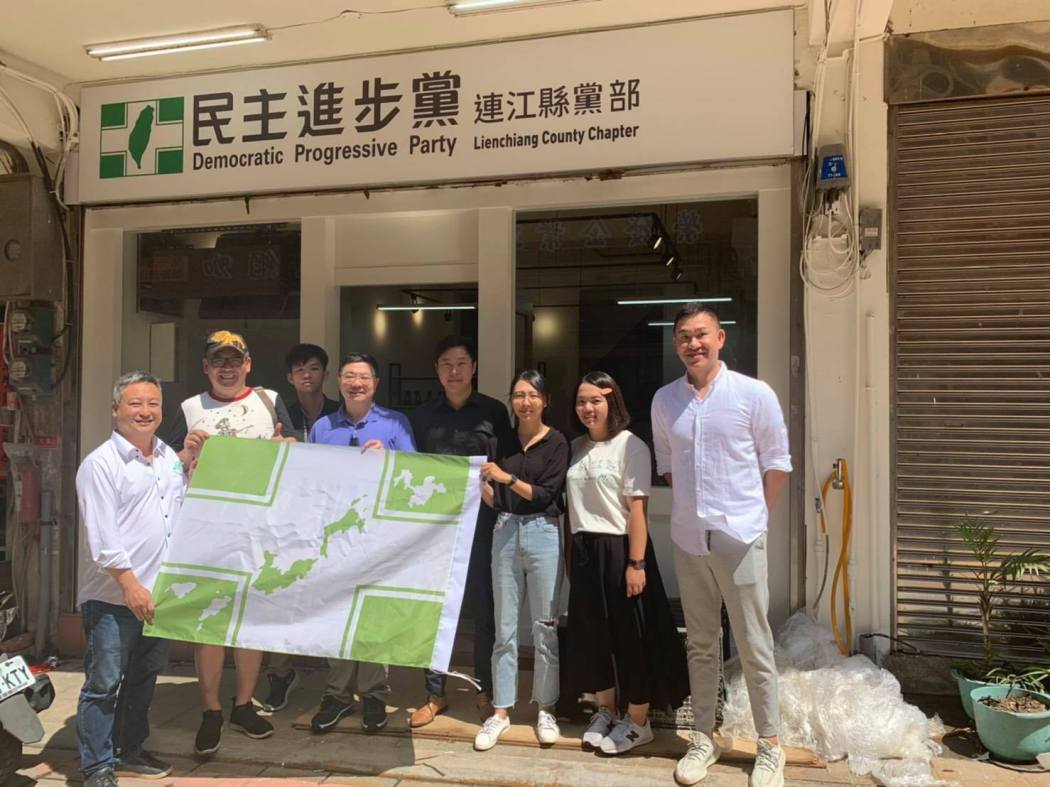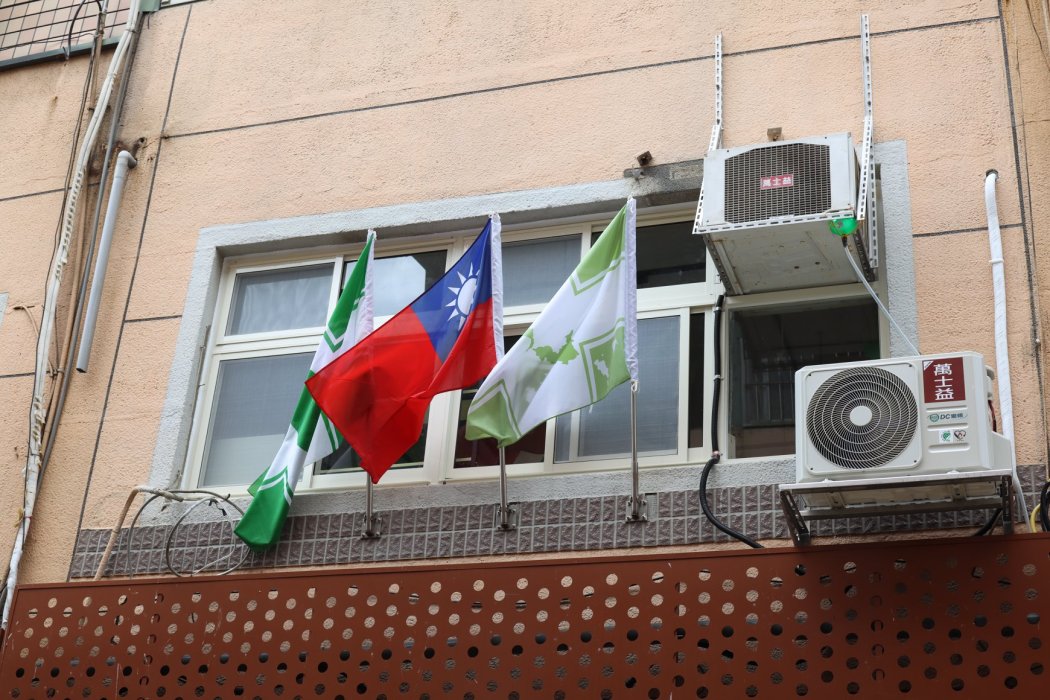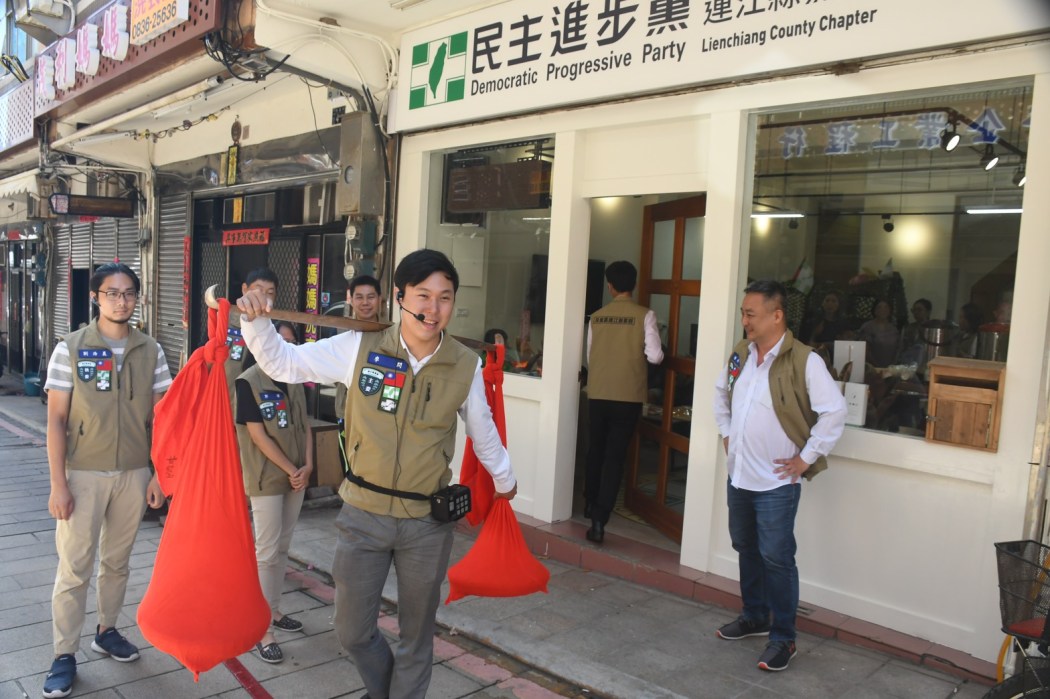Wen Lii was approached by Taiwan’s ruling Democratic Progressive Party (DPP) after it suffered significant losses in the 2018 mid-term elections and began looking for fresh candidates. He was offered the chance to stand in Taipei but turned them down.
Instead, the former policy researcher asked to run in Taiwan’s smallest electoral district: the Lienchiang County constituency on the Matsu Islands, a cluster of five populated islands off the coast of mainland China’s Fujian province and home to around 13,000 people. His request raised eyebrows.

“People were surprised within the party… Some thought it was a comic move,” Lii told HKFP.
For a start, the constituency is one of the staunchest supporters of the opposition Kuomintang (KMT) party and had been neglected by DPP political campaigners for over a decade. The last DPP candidate on Matsu, Tsao Cheng-ti, won only 142 votes — or 3.24 per cent — in 2008.
“When I decided to run for Matsu, I thought it was… not right for our party to leave a constituency without a candidate for a decade. You shouldn’t give up upon any given constituency,” Lii said.
For him, it was important for democracy to ensure every district had more than one candidate. Supporters of democratic values and Taiwanese sovereignty, he said, shouldn’t “selectively choose places to promote these ideals… just because the chances of election might be slimmer in that district.”

Matsu’s proximity to China also offered a unique setting where Liis’ interests in national security and foreign policy converged. A native of Hsinchu city in northern Taiwan, Lii had never lived on the islands before announcing his legislative run in 2019. But this didn’t deter him.
“I wanted to run in Matsu… to try to broaden the base of the DPP, so we can try to think about trying to reach out towards non-traditional supporters.”
Lii and his team landed on Matsu in the run-up to the 2020 elections with a campaign designed to spark conversations with locals. For the first ten days, to get his name known, he hiked around all five populated islands with a giant balloon announcing his campaign slogans strapped to his back.
He also engaged with the constituency wearing a bespoke mussel costume, in a nod to the islands’ famous seafood.

The unlikely politician won around 12 per cent of Matsu’s votes in January 2020, four times that of his predecessor over a decade ago. President Tsai Ing-wen, meanwhile, won 20 per cent. For Lii, this was a small victory for the party.
“In the legislative race, we received 706 votes. That was considered a significant growth from the previous 100-something votes. It was impressive for Matsu.”
‘Last piece of the jigsaw puzzle’
The day after the legislative and presidential elections, Lii and his team announced they would launch a DPP chapter in Lienchiang County, which was the last remaining constituency without a DPP office.
“Matsu is a border area between Taiwan and China… It’s important from a national standpoint for our party, which focuses on sovereignty, to pay attention to what’s happening at the borders,” he explained. Matsu’s main island is only 17 km from the Fujian coast while Taipei is over 200 km away.

Bejiing claims democratic, self-governed Taiwan as one of its provinces and views assertions of Taiwanese nationhood as a threat to its own sovereignty. As a cluster of Taiwan-governed islands off the coast of an authoritarian China, Matsu is at the forefront of a raft of issues involving the maritime environment, national security and border controls.
“It’s a mistake if we don’t even have an office there, if we don’t have anybody running in local posts and communicating to the general public,” Lii said.
In order to set up the office, Lii’s team had to convince enough locals to join the DPP since party regulations stipulate there must be at least 100 DPP members to form a county chapter in the offshore islands. When plans for the new office were announced in January 2020, there were only five party members in Matsu including Lii himself.
The team launched a cold-calling outreach campaign to recruit DPP members in a constituency overwhelmingly supportive of the opposition. Instead of meeting unified resistance, Lii found some local KMT supporters were willing to help. “Some people who were dissatisfied about the lack of internal democracy within the KMT, they wanted to see another party stir things up in Matsu.”

“We had people coming up to us saying that they didn’t 100 per cent support the DPP’s policies but they were positive about the DPP setting up an office there, since they were able to prevent a monopoly on political affairs on a local scale,” he said.
“They didn’t necessarily love the DPP or its policies, but they wanted to see competition between two political parties. Some of the local folks would say, even if they didn’t personally support the [party], they would pass our brochure to somebody they knew who was already a pan-green leaning supporter,” he said.

After a four-month recruitment campaign, the local DPP chapter officially opened last July with Lii as its director. It now has over 140 members.
Prior to July, the second-to-last DPP county chapter was established in 2000 on the Kinmen islands, another Taiwan-governed island off the coast of China. “After a hiatus of 20 years, we finally established our final office, the last piece of the jigsaw in our national outreach,” Lii said.
Cross-strait pressure
As director of the newest DPP county chapter, the 32-year-old now finds himself at the forefront of Chinese pressure from across the strait, or what he calls the “beta-testing ground” for Beijing to assert its dominance.
“We provide some very interesting examples of how China exerts pressure through non-military methods. What happens in Matsu gives us a window of the various different ways in which China… expands its influence.”
“Back in the day, Kinmen and Matsu would directly experience artillery shelling, cannons fired at us for several decades. But now what we’re facing is a new type of pressure. It’s often more subtle, it’s often smarter,” Lii told HKFP.

“People often describe Taiwan in general as being on the frontline of Chinese pressure… But for Kinmen and Matsu, we’re not only on the frontline, we’re the beta-testing ground. Since we’re even closer to China, a lot of the…challenges that we encounter might be seen in Taiwan a couple of years later.”
One such issue is a dramatic rise in illegal Chinese sand dredgers in Matsu’s waters and across the Taiwan Strait. According to Reuters, Taiwan expelled over 4,000 Chinese sand dredgers from its waters last year, a 560 per cent increase from the 600 vessels expelled in 2019.
“We’ve been seeing dredgers since five to ten years ago. Now they’ve crossed over the Taiwan Strait to the waters near Penghu,” Lii said, referring to another island off the west coast of Taiwan.
“The sand dredgers destroy the fishing industries and the tourism industries. It causes coastal erosion, it causes damage to the phone-line cables,” he said. “If the beaches keep receding, there will be nothing left for the tourists. And if the tourists don’t come, then there’s nothing for the business owners or the tour guides.”
“We’ve been asking the Taipei authorities to provide more resources to our coastguard, to send more ships to increase the safety of our patrol members,” he added.
Last December, new legal amendments increased penalties for illegal sand dredgers from NT$1-5 million to NT$100 million and up to seven years in prison. The amendments also tackled logistical challenges with storing seized dredgers. Lii said these moves sent a “strong message” to China.

“Taiwan and Matsu are actually leading the way in learning about how to handle large amounts of dredgers. And when other countries run into similar challenges in the future, we could… tell people about how you need various legal mechanisms to actually cope with these mechanical beasts intruding into your waters.”
Pressure from China also comes from leader Xi Jinping’s “Four New Links” initiative announced in 2019 to “promote connectivity wherever necessary” between the mainland and Kinmen and Matsu through natural gas, electricity, water pipelines and bridges.
As part of the initiative, Beijing has proposed a freshwater pipeline linking Matsu with the mainland, purportedly to ease a water shortage on the Taiwanese islands.
However, Lii told HKFP Beijing was propagating skewed narratives in order to consolidate links between the mainland and the Matsu islands. “You have these Chinese authorities or local opinion leaders who keep posting photos of reservoirs in Matsu and try to tell people that there’s a serious water shortage. It’s a misleading portrayal of the actual water situation in Matsu.”
He added that a single pipeline was nonsensical, as each of Matsu’s five populated islands has its own water supply system with no connecting pipeline.

China’s plans ignore geographical realities, he said. “The island closest to China is not even the island that uses the most water. The island that actually has the water shortage is further away from China. The island that uses the most water has the most water produced by desalination plants.”
‘Common ground’
Alongside resisting Chinese pressure, Lii also hopes to come up with fresh ideas about national identity, embracing its plethora of unique regional and cultural characteristics. “Our country consists of more than one island. Aside from the main island of Taiwan, we have to recognise the regional differences between Taiwan, Penghu, Kinmen and Matsu.”
He said it was important to work for a better Taiwan while respecting each region’s cultural idiosyncrasies.

Apart from being geographically distant from the rest of Taiwan, Matsu is also historically distinct from the main island.
After their defeat on the mainland by the communists, the Kuomintang or Nationalists fled to Taiwan in 1949 and ruled it as the Republic of China (ROC) under strict martial law for 38 years, until democracy was introduced in 1987.
But while the main island of Taiwan had been a Japanese colony for 50 years prior to 1949, Kinmen and Matsu had been under ROC-rule since the republic was established on the mainland.
“Kinmen and Matsu were never under Japanese colonial control, so it’s different from Taiwan,” Lii said. “The two islands were part of the Republic of China since its founding in 1911. That’s why they hold such a strong ROC identity.”
“So what’s important is to think about these ideas of solidarity and unity, all the while holding onto our cultural differences.”
The lack of a shared history and Matsu’s deep KMT roots mean its inhabitants traditionally identify as Chinese instead of Taiwanese. Instead of eroding Taiwanese identity, however, Lii sees Chinese identity on Matsu as an alternative to the one propagated by Beijing.

“So the Chinese Communist Party, they try to tell the world that if you identity with Chinese culture, then you must support the CCP. They try to equate the two. But what we’re seeing in Matsu, especially in the younger generation, is you can simultaneously take pride in Chinese culture or Fujian heritage and stand against authoritarianism, against the CCP.”
Lii added that another way to resist Chinese authoritarianism, which asserts a homogeneous national identity, was to embrace a nuanced sense of national unity without negating minority cultures in Taiwan.
“For Taiwan to move forward to become a better country, can we present a better narrative of national cohesion without erasing the identities of offshore islands?” he asked. “There should be unity or solidarity among people in Taiwan who hold a Chinese identity or a Taiwanese identity.”
This common, unifying factor should be support for democracy.
Edge of democracy
As a free enclave on the edge of China, the islands of Matsu offered a glimpse of what a democratic China can look like. “If we can create a working two-party system in Matsu, then we show to the world a positive example in which an area which speaks the Fuzhou language can [enjoy democracy].”
And some across the strait have been paying attention.
Lii showed HKFP a YouTube clip from 2018 of a question and answer forum conducted in the Fuzhou language between a government official and a county councillor during a local government session on Matsu.
The rare political discussion conducted in the local language struck a chord with some Chinese netizens across the strait. They expressed a yearning for democratic dialogue in their mother tongue.
“I am from Fuzhou. I have never felt this close to democracy,” read one comment in simplified Chinese characters.
“This is so rare, using Fuzhounese to discuss politics,” read another.
For Lii, the fact that Matsu can be a beacon of democracy on the edge of China is a source of pride. “I think this is something Matsu can be proud of, regardless of party politics.”
Support HKFP | Policies & Ethics | Error/typo? | Contact Us | Newsletter | Transparency & Annual Report | Apps
Help safeguard press freedom & keep HKFP free for all readers by supporting our team

LATEST FROM HKFP
HKFP has an impartial stance, transparent funding, and balanced coverage guided by an Ethics Code and Corrections Policy.
Support press freedom & help us surpass 1,000 monthly Patrons: 100% independent, governed by an ethics code & not-for-profit.











